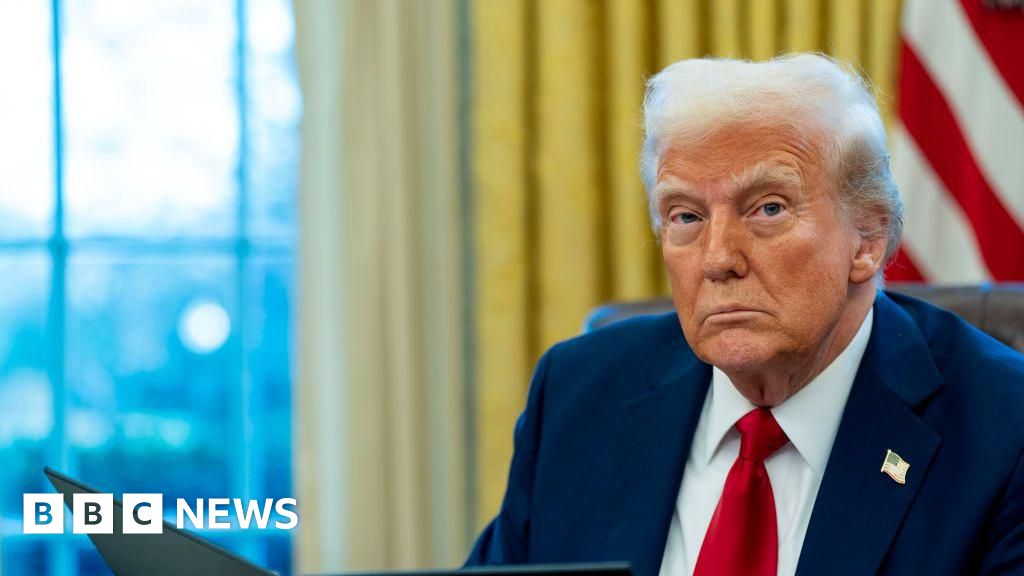- cross-posted to:
- politics@beehaw.org
- cross-posted to:
- politics@beehaw.org
Summary
Trump announced that 25% tariffs on imports from Canada and Mexico will take effect on February 1, though a decision on including oil remains pending.
He justified the move by citing undocumented migration, fentanyl trafficking, and trade deficits.
Trump also hinted at new tariffs on China.
Canada and Mexico plan retaliatory measures while seeking to address U.S. concerns.
If oil imports are taxed, it could raise costs for businesses and consumers, potentially contradicting Trump’s pledge to reduce living expenses.
Video game consoles are sold at a loss on occasion because the marginal cost of game sales is extremely high. There’s no associated product to pair with cement that would drive you to sell it at a loss.
My point was that yes, it will drive people to local businesses, because they will be cheaper. Local businesses have no reason to keep their prices the same if the competition just got more expensive however.
I’m glad you found my comment informative. I’d hate to think I was talking to someone who wanted to say their opinion and then got defensive if someone disagreed with them. It’s a sign of someone with at least a wrinkle or two that they’re open to discussing their thoughts.
For more insight from people even more knowledgeable than me:
https://www.businessinsider.com/what-are-tariffs
https://paulkrugman.substack.com/p/the-end-of-north-america
https://taxfoundation.org/research/all/federal/trump-tariffs-trade-war/
deleted by creator
So do either of those strategies apply to the manufacturing of physical goods as are being tarifed?
Do you think that Ford is going to sell cars at a loss to make money on service contracts now that their costs are rising because some parts are fabricated in Detroit, assembled in Windsor, and then shipped back for installation in Flint? If it didn’t make sense to sell at a loss before, why would it make sense to do so now?
Do you think that there’s money to be made on getting people hooked on buying wheat perks?
We’re not talking videogame DLC, we’re talking about food, manufacturing materials, electrical power, and physical goods. The price of these things are going up, just like they went up with previous tariffs. This is a super easy case, because he did it to a lesser extent before, and it didn’t do what he’s saying it will. There’s no reason to believe that making the bad choice more vigorously will make it suddenly have a different outcome.
deleted by creator
Dude, go reread my first comment. I specifically mention tarrif as a counter to restore market balance after manipulation. These aren’t being used to counteract an anticompetitive subsidy. Raising prices to restore equilibrium and raising prices to disrupt it are very different things.
I know you want this to be something that works, but there’s a reason why reputable economists think this is just the worst idea.
deleted by creator
I do ultimately think tariffs will be good for the US.
Can you see how maybe it would be easy for a person to think that you thought tariffs would be good for the US? If that wasn’t your point, then I have no idea what you’re talking about.
Why don’t you care what economists say? They’re people who have actually spent time looking at and thinking about these things. They have numbers to back up their claims and, while fallible, they’re likely the most qualified people to make assessments about the economic impact of policy changes.
It’s like saying you don’t care what engineers say when what you’re doing is building a bridge. At the very least it should raise a red flag when nearly all of them say something is a bad idea.deleted by creator
I literally linked you to a large collection of their statements on the matter, backed by data. “Appeal to authority” isn’t a magic phrase that lets you dismiss expertise entirely. “Appeal to authority” is a fallacy, but “deferring to expertise” is not. I’m not saying these tariffs are wrong because economists say they are, but that it’s reasonable to accept consensus opinion of regarded experts without walking through every step of their argument.
In general, the use of argument from expert opinion is a reasonable, if inherently defeasible, type of argument. Appeals to expert opinion can be a legitimate form of obtaining advice or guidance for drawing tentative conclusions on an issue or problem where objective knowledge is unavailable or inconclusive. It is well recognized in law, for example, where expert testimony is treated as an important kind of evidence in a trial, even though it often leads to conflicting testimony, in a “battle of the experts.”
I specifically mentioned that they can be wrong, and that it’s maybe worth reconsidering when you’re disagreeing with the experts. Of course engineers can make mistakes. But if a group of them say “that bridge is unsafe, we can show you our calculations”, and a non-engineer says that they have an “intuitive feeling” that it is, I know who I’m listening to.
Are you going to keep shifting to different topics? As far as economic arguments go “there’s a theoretical economist who thinks this is a good idea that I haven’t cited and that agrees with my intuition” is… Not very interesting.



